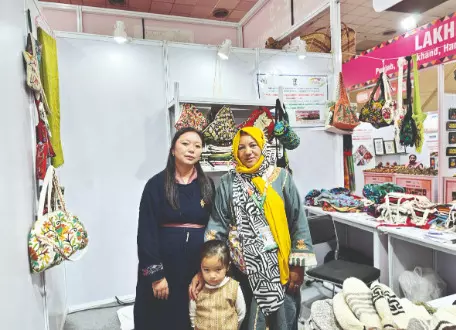‘From villages to vibrant stalls’: Rural women entrepreneurs rewrite their future at IITF ‘25

NEW DELHI: At the SARAS Aajeevika Mela 2025 in Pragati Maidan, organised by the Ministry of Rural Development, a deeply transformative journey is unfolding for hundreds of rural women entrepreneurs. The fair, which features artisans from Punjab, Haryana, Himachal Pradesh, Uttar Pradesh, Jammu & Kashmir, Ladakh and Madhya Pradesh, has provided free stalls to Self-Help Group (SHG) women, allowing them to retain every rupee earned through their work. The initiative reflects a larger national vision of empowering “Lakhpati Didis” and nurturing self-reliance among women from rural and remote regions.
Walking through the exhibition halls, a visitor encounters a mosaic of stories of courage, personal reinvention, and silent determination behind every piece of craft. At Stall No. 68, Shanti Bai and Rachna Bai from Chanderi village in Madhya Pradesh stand quietly yet confidently beside their handloom cotton suits, saris and traditional textiles. This is their first experience selling at a major fair, and though sales have been modest about 10–15 suits and some saris they remain optimistic. “People bargain a lot, but we offer fair discounts. If something is ₹2000, we give it for ₹1500 when the buyer is genuine,” they say, reflecting the honesty and simplicity with which they run their stall.
Both women share that the decision to become entrepreneurs came from a desire to give themselves “a chance to learn, grow, and become self-independent.” They admit they are still learning the nuances of marketing and communication and do not speak English, but the government has provided support in the form of Aakriti, a sales assistant. “I feel proud helping rural women understand customers better. They inspire me with their determination,” Aakriti says.
Similar narratives emerge across the mela. Two women from Ladakh, accompanied by a two-year-old child, share that they faced no discrimination and were encouraged equally. Their stall features handcrafted items unique to Ladakhi culture. In another aisle, women from Kashmir, Bihar and Uttar Pradesh display embroidered goods, handmade décor, spices and regional artifacts each stall a testament to India’s diverse artistic landscape.
More than a marketplace, the fair stands as a platform of dignity and opportunity. For many of these women, this is their first exposure to a national audience, their first earnings from independent work, and their first step toward economic agency. The SARAS Aajeevika Mela this year not only celebrates rural craftsmanship but also the resilience and aspirations of women who are reshaping their lives, one handcrafted piece at a time.



